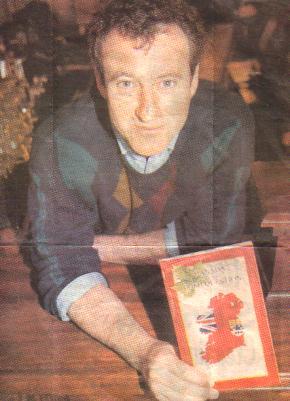Canada and the Irish Question, 1867 to
the Present.
Phillip James Currie. Self
Published by the Author, Victoria, BC, Canada, 2001.
From Munro’s Books, 1108 Government Street,
Victoria, BC, Canada, V8W 1Y2. $14.00 Cdn.
OVER THE past two centuries, Canada (or British North America) was settled by scores of Protestant and Roman Catholic Irish in various waves. As these varied colonists carried with them their churches, fraternal societies, and memories of the problems back in the ‘auld sod’ it was only obvious that the proposals for Irish Home Rule would garner interest in the fledgling dominion. Phillip Currie, originally from Belfast and now a naturalized Canadian, has broken new ground with his fine documented analysis. In presenting many little known historical facts Phillip contends that Canadian interest in Ireland “was about a good deal more than Ireland…it was about Canada itself…it was about Canadian identity, Canadian principles…it was about Canadian’s notions of their country’s place in the world, and their notions of government.”
The Irish Home Rule debates were front-page news stories in the old Canada. During those three Home Rule crises both pro-nationalist and pro-unionist rallies attracted up to 4,000 souls in Canada’s largest cities. Ulster readers would probably be intrigued in knowing that the Canadian battle lines involved more than just Orange and Green. Many Home Rule supporters were Protestant, such as Edward Blake, the leader of the opposition Canadian Liberal Party in the 1880s. Blake and other Liberals contended that with Canada and other loyal British colonies having home rule, then why should this be denied to Ireland? Yes, “Ireland’s cause” also had a sympathetic hearing in Roman Catholic French Canada. When Westminster debated the first two Home Rule bills the Canadian federal Parliament, and the Ontario and Quebec legislatures, passed resolutions in support of Irish Home Rule.
Naturally the main source of Canadian opposition to Irish Home Rule was the Orange Order, which had become a prominent institution in English-speaking Canada. The Orangemen were eager to support their Ulster brethren, but they also had supporters beyond the sash. They shared platforms with historian Goldwyn Smith, a Pan-Anglo-Saxon advocate in the 1880s and 1890s, and later they worked with the advocates of imperial federation. It was in the third Home Rule crisis that the unionists had the upper hand in the Canadian debate. This time there was no supportive resolution coming from Canada’s legislatures. When Irish Nationalism turned from home rule to anti-British republicanism in 1919 any discussion on Ireland in Canada was largely of a unionist bent until 1969.
Phillip’s chapter on Canada and the current troubles and the peace process would especially interest any Ulster reader. The unionists have often been dumbfounded over their lack of support in mainland Britain, and they probably wonder why the supposed knee-jerk support from the loyal dominions has not come. Since 1969 Canadian interest in Ulster has largely been that of an onlooker, notwithstanding the few activists on both sides. Contemporary post-imperial Canada is largely liberal, secular and multi-cultural, due to many demographic and social changes. Of this reality, Phillip gives a fine colourful description.
Canada and the Irish Question is well researched to satisfy the scholar, but it is also written in very readable prose for the general reader. In searching first hand sources of Canada’s past, Phillip has combed the libraries for the old newspapers. He has checked most of Canada’s dailies, along with the church and lodge papers. In the days before TV and radio the newspaper was a major source of news and opinion about events in the wider outside world. In the days before multi-national media conglomerates most papers were locally and independently-owned, and were thus at liberty to print what they wanted. From Phillip’s research we find that turn-of –the-century events in Ireland were front page news not only in ‘Orange’ Toronto, but also in the booming prairie town of Winnipeg, and in the Pacific port of Vancouver.
Phillip Currie lives in Victoria, and apparently he lives only five minutes away from my home. (We have met a couple of times at the James Bay Inn to talk about Ulster matters over a pint!) Given that he has lived both in Canada and in Ulster he has filled a needed gap in Canadian and Irish history. Cheers, Phillip!
Alex Greer